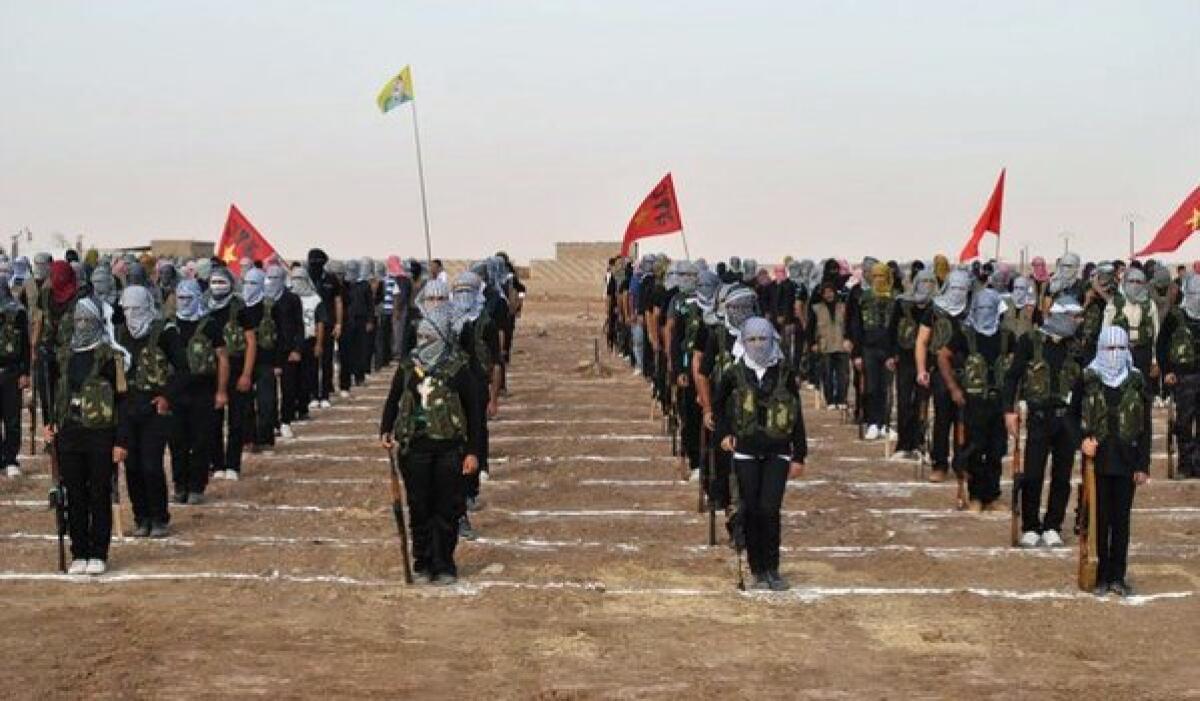Syria: Kurds reportedly released by kidnappers linked to Al Qaeda

- Share via
BEIRUT — A rebel group in Syria with links to Al Qaeda was reported Sunday to have released hundreds of kidnapped Kurdish civilians after clashes with Kurdish militiamen that reflected the increasingly open hostility among armed factions in rebel-held parts of Syria.
The release of the abducted Kurds follows battles this weekend in the northern Syrian town of Tal Abyad, along the Syrian-Turkish border, pitting Kurdish forces against fighters from the Islamic State of Iraq and al-Sham, a powerful Syrian rebel faction that has ties to Al Qaeda.
The Kurdish civilians were freed in exchange for the release of a rebel leader, or emir, identified only as Abu Musab, reported the Syrian Observatory for Human Rights, a pro-opposition monitoring group based in Britain.
The incident highlights the profound distrust between Syrian Kurdish militias and Syrian Arab rebels, both powerful blocs in “liberated” zones of northern Syria. The dispute is also indicative of what appears to be an increasingly chaotic and fractured tableau inside rebel-held swaths of Syria.
The hostilities among armed groups in areas where the government is no longer present underscore the lack of a coherent command structure among the hundreds of Syrian rebel factions on the ground. Some fear the more-than-two-year rebellion against President Bashar Assad could devolve into a series of territorial battles among disparate rebel bands and local militias with varying agendas.
The discord in the opposition ranks comes as the Syrian military has been mounting an offensive aimed at pushing back rebel forces throughout much of the nation.
This week, Gen. Salim Idris, the ostensible head of the U.S.-backed Free Syrian Army, or FSA, is scheduled to visit the United States in a bid to pressure Washington to provide more arms to fighters affiliated with his umbrella faction, the Supreme Military Council. However, some U.S. lawmakers have balked at White House plans to arm the Syrian rebels, voicing fears that weapons could end up in the hands of anti-western militants with ties to Al Qaeda.
The FSA labels itself moderate and says its goal is a secular democratic state in Syria. But the group operates less like a top-down military hierarchy and more in the style of a loose franchise operation. On the ground, the line is sometimes blurred between rebel units that proclaim affiliation with the FSA and fighters who say their goal is an Islamist theocracy.
The FSA says one of its commanders was killed this month by an Islamist brigade in northwestern Latakia province. The FSA leadership has demanded that the alleged killer be handed over. The incident is just one of a number of clashes between rebel groups in recent weeks that have raised the specter of a civil war within Syria’s larger civil war.
The tensions among the fractured opposition fighting forces have been especially high in rebel-held swaths of northern Syria. The area is also home to the majority of Syria’s Kurds, a non-Arab ethnic group that represents at least 10% of Syrian’s total population and has complained of long-running discrimination.
In the past year, well-organized Kurdish militias have tried to take control of Kurdish-majority areas. The Kurds have occasionally clashed with Arab rebels, though both sides have generally sought to avoid confrontation, despite their varying ideologies and goals.
Most Kurdish groups are secular in nature, while many Syrian Arab rebel brigades are deeply Islamist. Arab rebel factions generally are wary of Kurdish aspirations for greater autonomy. Some rebel leaders view the Kurdish militias as collaborators with the Syrian government—a charge the Kurds deny.
Last week, amid intense fighting, Kurdish militiamen seized control of the Ras al-Ayn, a border town in northern Hassaka province and home to Syria’s largest Kurdish population. The Kurds reportedly expelled Al Qaeda-linked rebels from the border town.
This weekend’s clashes were reported in Tal Abyad in Raqqah province, east of Ras al Ayn. Tal Abyad is also home to a large Kurdish population.
The rise of autonomy-minded Kurdish armed groups in northern Syria has caused deep dismay in neighboring Turkey, a major regional power and firm backer of the uprising against the Syrian government. For decades, Turkey has fought a bloody war against a Kurdish rebellion led by the Kurdistan Workers Party, or PKK, which Ankara labels a terrorist organization.
Turkish officials view the best-armed Syrian Kurdish group, the Democratic Union Party, as a front for the PKK. Turkish authorities have said they will not tolerate a “terrorist” haven along their border with Syria.
ALSO:
Retired general criticizes U.S. response to alleged Iranian plot
Beijing bombing suspect: Years of grievances over harsh treatment
The (somewhat) breathless wait for Britain’s royal baby
Special correspondent Nabih Bulos contributed to this report
More to Read
Sign up for Essential California
The most important California stories and recommendations in your inbox every morning.
You may occasionally receive promotional content from the Los Angeles Times.










